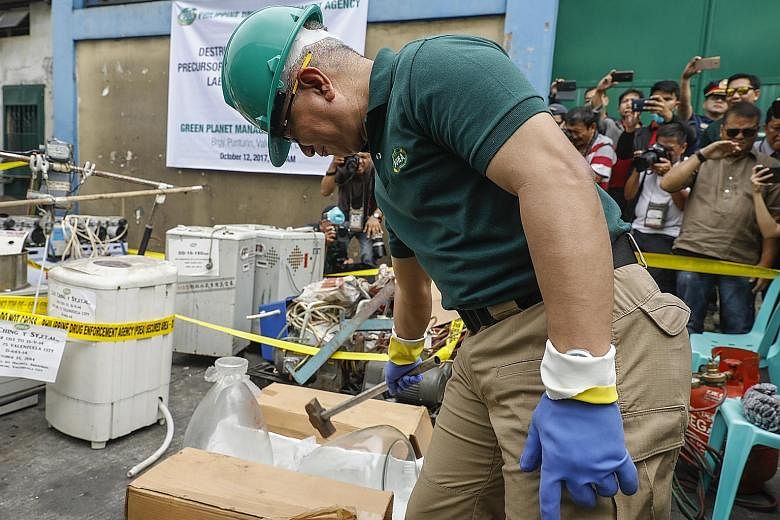The Philippine police are suspending all anti-narcotics operations, which have sparked public outrage over the deaths of thousands of mostly poor suspects.
Growing anger over the violence, including killings by hit squads, has also caused President Rodrigo Duterte's popularity to plummet.
Mr Duterte took his war on drugs away from the 170,000-strong Philippine National Police (PNP) on Wednesday and handed it over to the much smaller Philippine Drug Enforcement Agency (PDEA).
"This is better for the bleeding hearts and the media. I hope I will satisfy you," he said yesterday, acknowledging that unprecedented scrutiny of his drug war has forced him to take a step back.
Presidential spokesman Ernesto Abella said at a news briefing: "We now target higher echelons of the syndicates, as well as their protectors in government."
Mr Duterte, though, again blasted European nations critical of his drug war, saying: "Maybe this will… suffice for those stupid European Union guys."
The European Parliament called on the Philippines last month "to put an end to the current wave of extrajudicial executions and killings".
Mr Duterte dared EU states to cut diplomatic ties with the Philippines.
"The ambassadors of those countries listening now, tell me, because we can have diplomatic channel cut tomorrow. You leave my country in 24 hours, all of you," he said.
The PNP's chief, director-general Ronald de la Rosa, told reporters that all drug-related missions, including the controversial Operations Plan Tokhang (Knock), which cracked down on small-time drug pushers and users in metropolitan Manila's rundown districts, would be turned over to the PDEA, which has about 2,000 agents. He said the police would instead focus on non-drug related crimes, and on cleansing its ranks.
Police say at least 3,900 drug suspects have been killed in purported shoot-outs. Human rights activists insist that vigilantes, riding pillion on motorcycles, were responsible for more than 7,000 other killings.
The Philippine human rights commission hailed the move as a "welcome development".
"We are hopeful and confident that with the professionalism and expertise of the PDEA… the campaign against drugs will be carried out with strict adherence to the rule of law," it said in a statement.
This is the second time that the PNP is opting out of the drug war. It refocused its efforts in January on purging its ranks of rogue officers following a scandal over the kidnap-slaying last year of a South Korean, purportedly by anti-narcotics officers. It resumed the drive a month later, promising a "kinder, gentler" campaign.
But in August, law enforcers killed nearly 100 suspects in a series of "one-time, big-time" drug raids across metropolitan Manila and in nearby suburbs.
The death of a 17-year-old in one of these raids stirred public anger after security footage showed what appeared to be images of police dragging the teen minutes before he was shot and killed.

